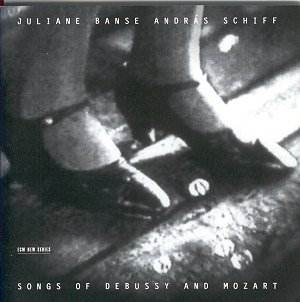It is always worth expecting the unexpected
with labels like ECM. They constantly keep you on your toes. Songs
by Debussy and Mozart is the title, and one may well ask where
the link could possibly be. Well, Mozart has been credited with
something approaching the first French mélodie,
settings of two French texts designed to woo his Parisian audience.
In reality, they sound light years away from the harmonic adventurousness
of Debussy’s Symbolist settings (which form the bulk of the disc),
and are best seen as contrasting items in what is a very enjoyable
recital.
Much of the credit for that enjoyment must go
to artists involved. I was alerted to the voice of Juliane Banse
by a DG disc of 2nd Viennese School music, in particular
the glorious Altenberg Lieder by Berg. Those settings,
which border on musical impressionism for richness and colour
of orchestral palette, made me want to hear her in Debussy. Well,
here it is, albeit with piano, and it does not disappoint. Banse’s
subtle, dark-toned soprano is ideal for much of this material,
the most inspired of which are settings of Paul Verlaine poems.
Debussy admired Verlaine all his life, and the shadowy, half-lit
world of that great monument to Symbolism, Pelléas et
Mélisande, is never far away. In truth most of the
settings are quite early, so can be seen in some ways as a dry
run for the vocal style of his operatic masterpiece. She is particularly
successful in conveying the emotion behind each poem, whether
it is the evocation of nature in Beau soir, or the more
nightmarish melancholy of Mallarmé’s Apparition.
The only question mark comes in the somewhat forced tone of the
higher tessituras or climactic moments – try 1’20 into track 2,
where she sounds a tad strained on the higher notes. These are
very fleeting moments, however, for most of these settings lie
in a perfect register for her voice, and she makes the most of
it. As indeed does Andras Schiff, whose credentials in Mozart
are cast iron but less well known in Debussy. It’s good to report
that his superb musicianship helps Banse at every turn, and his
clarity of finger work (helped here by his usual choice of instrument,
a bright-ish Bösendorfer) ensures no sentimentality or cloying
pedal effects hold up proceedings unnecessarily.
The Mozart items are an unqualified success.
The French settings are certainly of interest, but musically his
mature (K523) song Abendempfindung (Thoughts of Eventide)
holds one throughout with its elaborate range and depth of emotion,
a virtual mini-operatic scena. I had realised by this time
in the recital how the two composers were complementing each other,
two great musical minds a century apart responding to their favourite
poetry, as well as the beauty (and challenge) of setting for soprano
and piano.
The recording, as one has come to expect from
ECM, is demonstration worthy, with clarity, transparency and depth
in perfect measure. No texts are included, and we are encouraged
to download from the website (12 pages of it, but in good, readable
print and translations). The booklet is devoted to a rather ponderous
essay entitled Mozart, Debussy and the law by Jacques
Drillon, where we are treated to a discourse on how Debussy broke
with the laws of tonality exemplified in the Classical era by
Mozart. This is fine, but lets itself down by the style of its
prose. Try this; "Until Marx and Freud, it was normal, and
almost inevitable, that Daddy Bear had a big bowl, Mummy Bear
had a medium-sized bowl, and Baby Bear a little bowl. Now all
that was turned on its head. Mummy Bear is drinking out of the
big bowl, Baby Bear finds that his bowl is enormous, and Daddy
Bear just isn’t thirsty". Entertaining, but really enlightening
or appropriate? Ah well, the music’s the thing, and this disc
is the perfect spring serenade.
Tony Haywood
